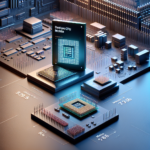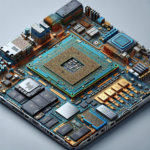How CPUs Handle Data Encryption and Decryption

Introduction
In the digital age, data security is paramount. As cyber threats become increasingly sophisticated, the need for robust encryption and decryption mechanisms has never been more critical. Central Processing Units (CPUs) play a pivotal role in these processes, ensuring that sensitive information remains secure. This article delves into how CPUs handle data encryption and decryption, exploring the underlying mechanisms, technologies, and their implications for data security.
Understanding Data Encryption and Decryption
What is Data Encryption?
Data encryption is the process of converting plaintext (readable data) into ciphertext (unreadable data) using an algorithm and an encryption key. This ensures that unauthorized parties cannot access the data without the corresponding decryption key. Encryption is widely used in various applications, including secure communications, data storage, and financial transactions.
What is Data Decryption?
Data decryption is the reverse process of encryption. It involves converting ciphertext back into plaintext using a decryption key. Decryption allows authorized parties to access and read the original data. The security of the decryption process relies on the strength of the encryption algorithm and the secrecy of the decryption key.
The Role of CPUs in Data Encryption and Decryption
CPU Architecture and Instruction Sets
Modern CPUs are designed with advanced architectures and instruction sets that facilitate efficient data encryption and decryption. These instruction sets include specialized commands that accelerate cryptographic operations, reducing the computational overhead and improving performance.
Hardware-Based Encryption
Many CPUs come with built-in hardware-based encryption features. These features offload cryptographic tasks from the main CPU, allowing for faster and more secure encryption and decryption. Examples of such technologies include Intel’s AES-NI (Advanced Encryption Standard New Instructions) and AMD’s Secure Processor.
Software-Based Encryption
In addition to hardware-based encryption, CPUs also support software-based encryption. This involves using software libraries and algorithms to perform cryptographic operations. While software-based encryption is generally slower than hardware-based encryption, it offers greater flexibility and can be used on a wider range of devices.
Key Technologies and Mechanisms
Advanced Encryption Standard (AES)
AES is one of the most widely used encryption standards. It is a symmetric key algorithm, meaning the same key is used for both encryption and decryption. AES is known for its high performance and strong security, making it a popular choice for various applications. CPUs with AES-NI support can perform AES encryption and decryption much faster than those without.
Public Key Infrastructure (PKI)
PKI is a framework that uses asymmetric key pairs (a public key and a private key) for secure communications. The public key is used for encryption, while the private key is used for decryption. CPUs play a crucial role in managing and processing these keys, ensuring secure data transmission and authentication.
Secure Enclaves
Secure enclaves are isolated areas within a CPU that provide a secure environment for sensitive operations. These enclaves protect cryptographic keys and other sensitive data from unauthorized access, even if the main operating system is compromised. Examples include Intel’s SGX (Software Guard Extensions) and ARM’s TrustZone.
Performance Considerations
Impact on CPU Performance
Encryption and decryption operations can be computationally intensive, impacting overall CPU performance. However, modern CPUs are designed to handle these tasks efficiently, minimizing the performance overhead. Hardware-based encryption, in particular, significantly reduces the impact on CPU performance.
Optimizing Performance
To optimize performance, developers can leverage hardware-based encryption features and use efficient cryptographic libraries. Additionally, parallel processing and multi-threading can be employed to further enhance performance, especially for large-scale encryption and decryption tasks.
Security Implications
Protecting Sensitive Data
CPUs play a critical role in protecting sensitive data through encryption and decryption. By ensuring that data is encrypted before transmission or storage, CPUs help prevent unauthorized access and data breaches. This is particularly important for financial transactions, personal information, and confidential communications.
Vulnerabilities and Mitigations
Despite their advanced security features, CPUs are not immune to vulnerabilities. Side-channel attacks, such as Spectre and Meltdown, exploit weaknesses in CPU architecture to gain unauthorized access to sensitive data. To mitigate these risks, manufacturers regularly release firmware updates and patches. Additionally, developers can implement security best practices, such as using strong encryption algorithms and regularly updating software.
Future Trends
Quantum Computing
Quantum computing poses both challenges and opportunities for data encryption and decryption. While quantum computers have the potential to break current encryption algorithms, they also offer the possibility of developing new, more secure cryptographic methods. Researchers are actively exploring quantum-resistant algorithms to ensure future data security.
Artificial Intelligence and Machine Learning
Artificial intelligence (AI) and machine learning (ML) are increasingly being used to enhance data encryption and decryption. AI and ML can help identify patterns and anomalies, improving the detection of potential security threats. Additionally, these technologies can optimize cryptographic algorithms, making them more efficient and secure.
FAQ
What is the difference between hardware-based and software-based encryption?
Hardware-based encryption uses specialized hardware within the CPU to perform cryptographic operations, resulting in faster and more secure encryption and decryption. Software-based encryption, on the other hand, relies on software libraries and algorithms to perform these tasks. While software-based encryption offers greater flexibility, it is generally slower than hardware-based encryption.
How do CPUs handle encryption keys?
CPUs manage encryption keys through secure key storage mechanisms, such as secure enclaves. These isolated areas within the CPU protect cryptographic keys from unauthorized access, ensuring that sensitive data remains secure. Additionally, CPUs support key management protocols, such as PKI, to facilitate secure key exchange and authentication.
What are side-channel attacks, and how do they affect CPU security?
Side-channel attacks exploit weaknesses in CPU architecture to gain unauthorized access to sensitive data. Examples include Spectre and Meltdown, which take advantage of speculative execution and other CPU features. To mitigate these risks, manufacturers release firmware updates and patches, and developers implement security best practices.
Can quantum computing break current encryption algorithms?
Quantum computing has the potential to break current encryption algorithms, such as RSA and ECC, by solving complex mathematical problems much faster than classical computers. However, researchers are actively developing quantum-resistant algorithms to ensure future data security. These new algorithms aim to provide robust protection against quantum computing threats.
How can developers optimize encryption and decryption performance?
Developers can optimize encryption and decryption performance by leveraging hardware-based encryption features, using efficient cryptographic libraries, and employing parallel processing and multi-threading techniques. Additionally, staying up-to-date with the latest security patches and best practices can help maintain optimal performance and security.
Conclusion
CPUs play a crucial role in data encryption and decryption, ensuring that sensitive information remains secure in an increasingly digital world. By leveraging advanced architectures, instruction sets, and hardware-based encryption features, modern CPUs can efficiently handle cryptographic operations. As technology continues to evolve, it is essential to stay informed about emerging trends and potential vulnerabilities to maintain robust data security. Through a combination of hardware and software solutions, CPUs will continue to be at the forefront of protecting our digital lives.




